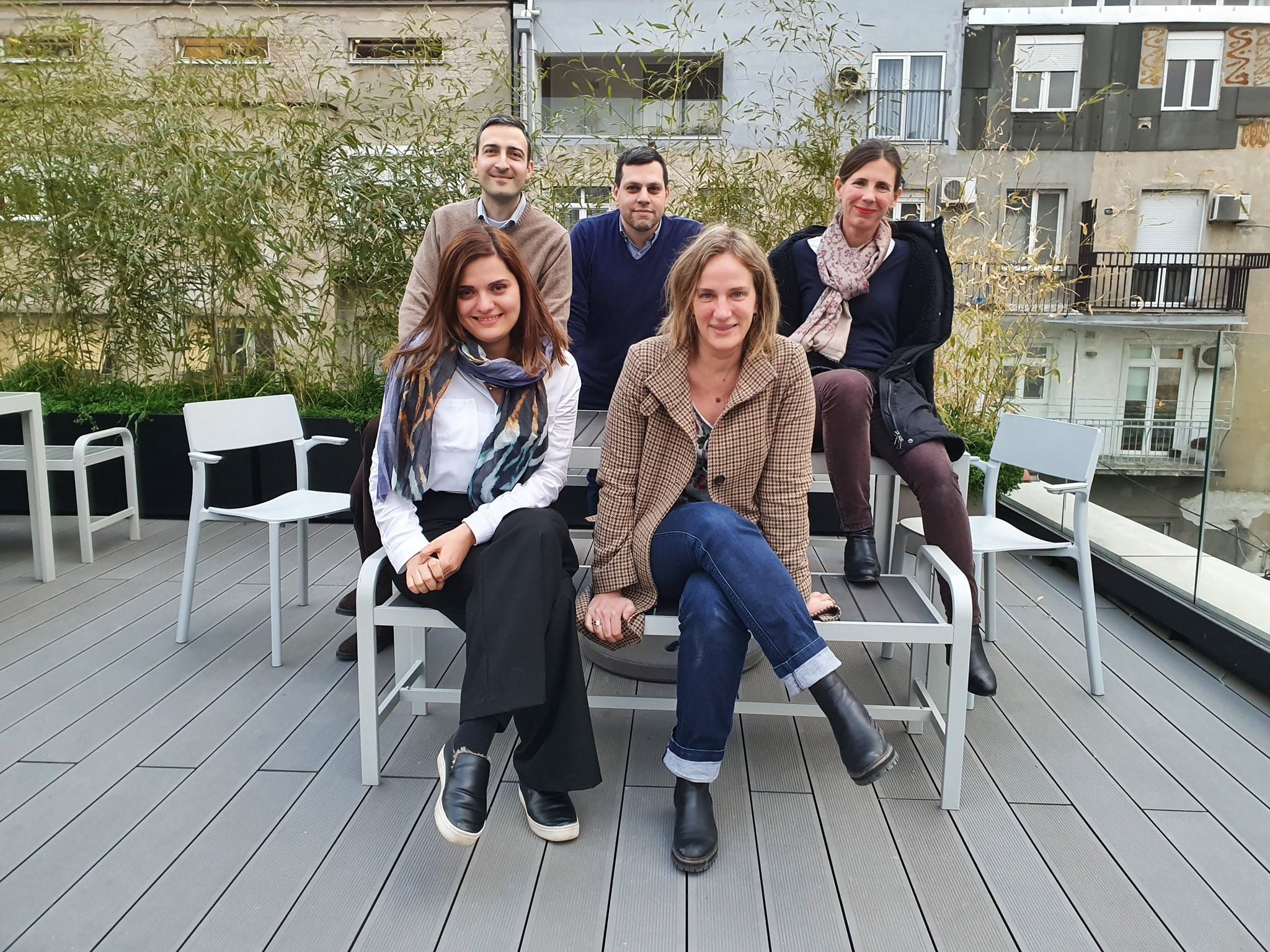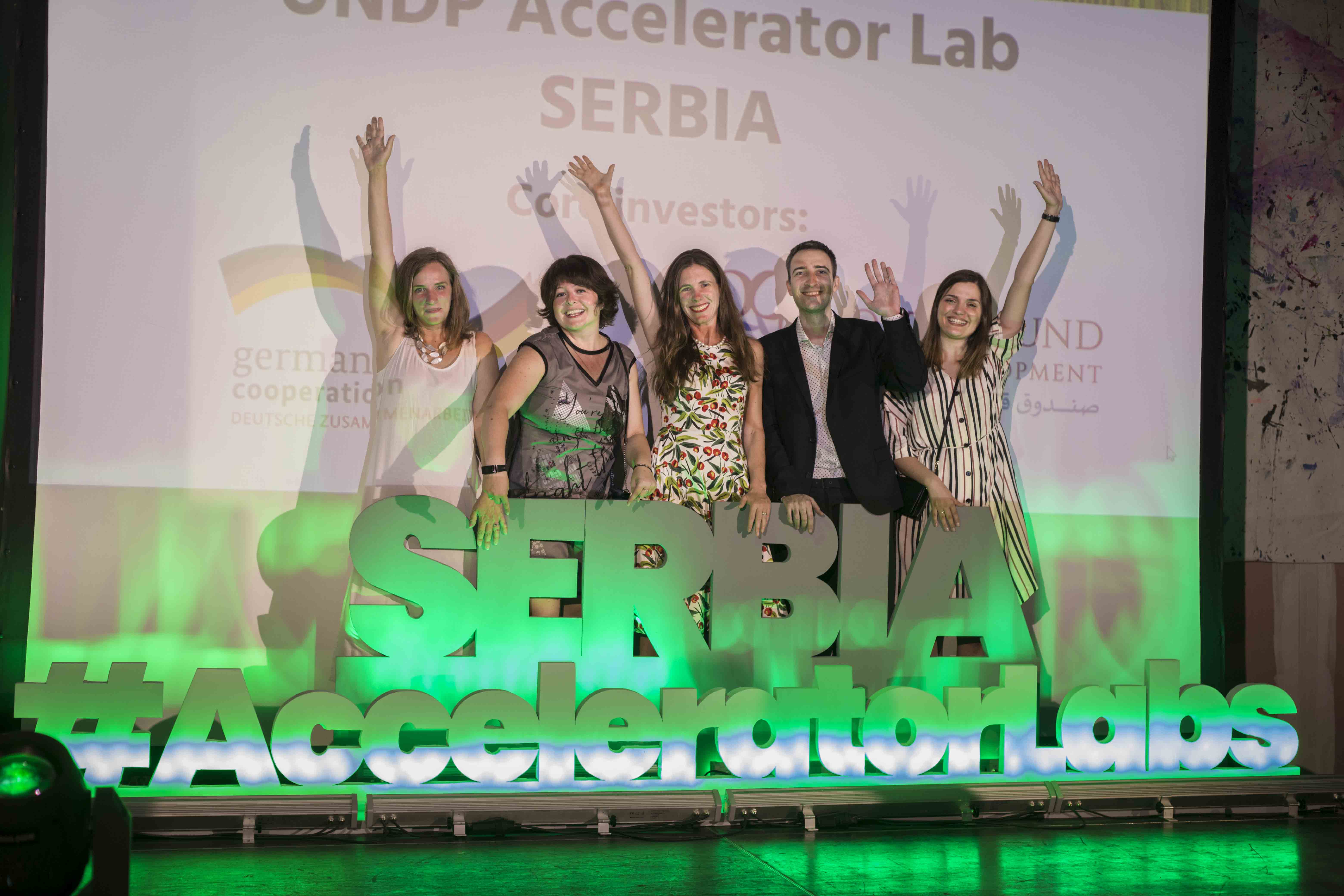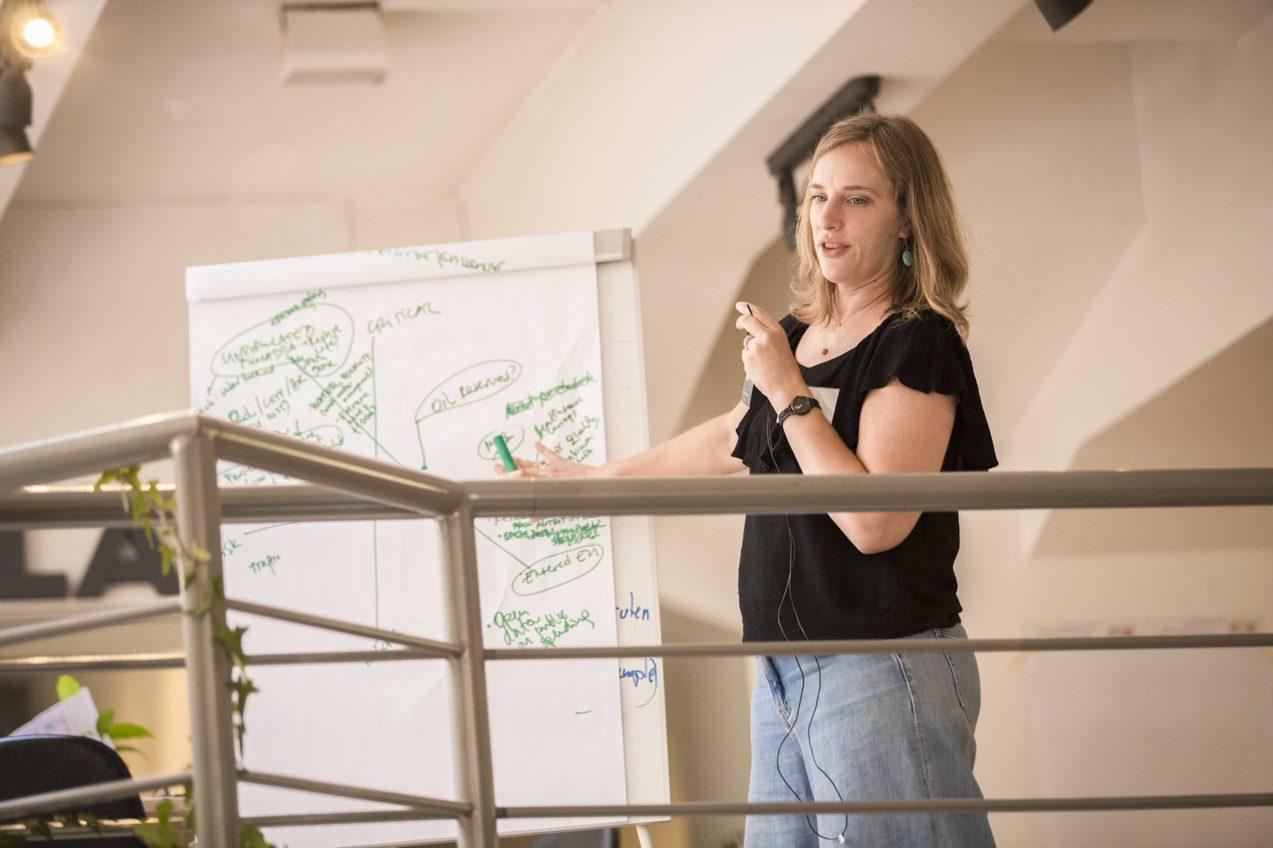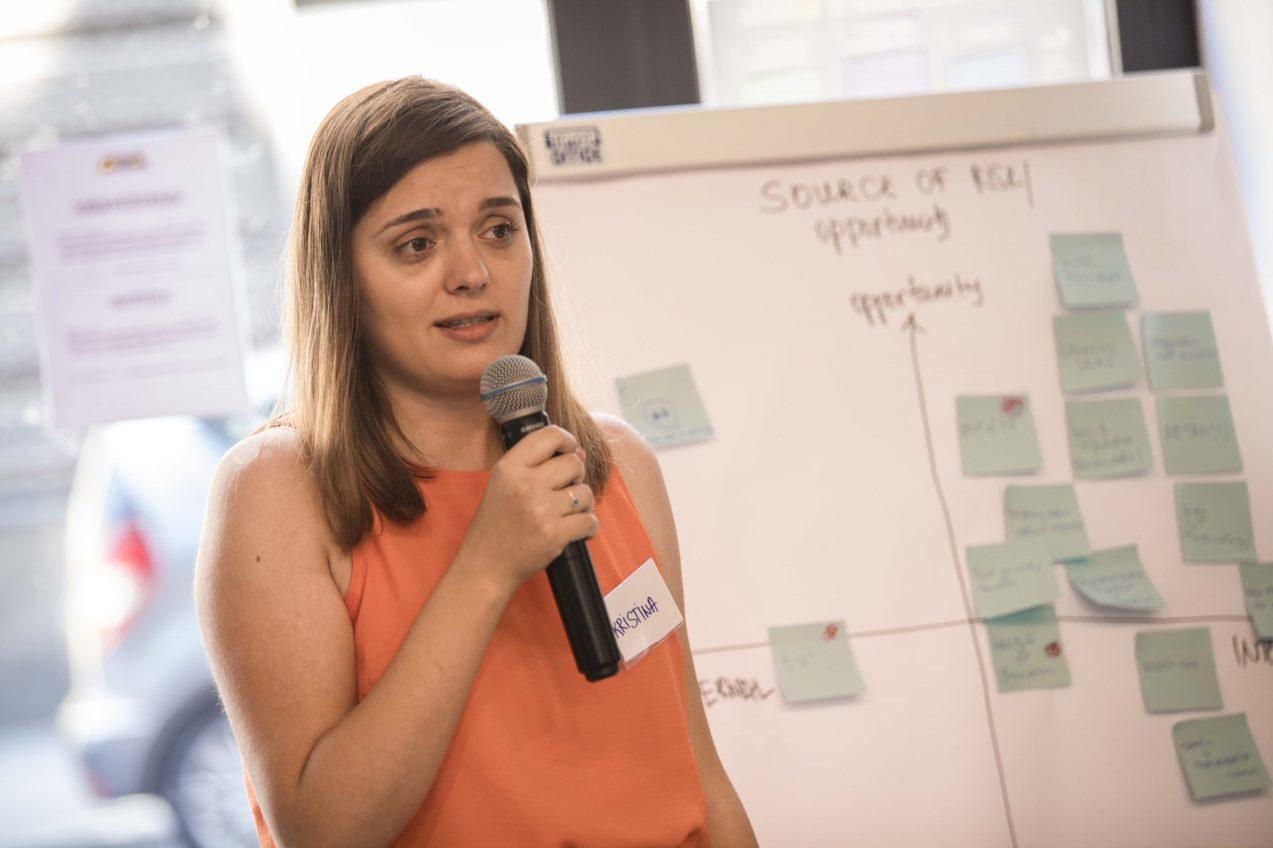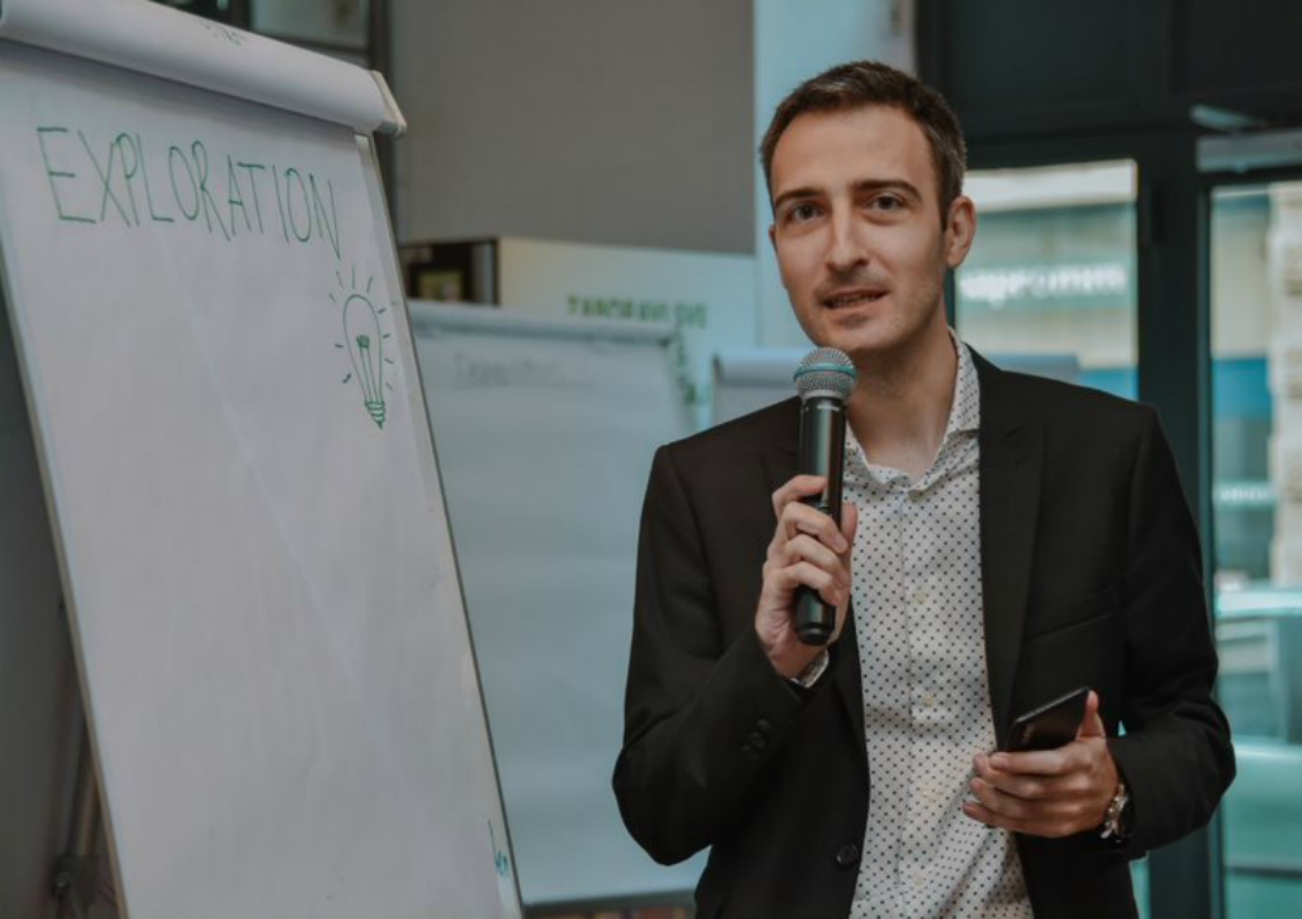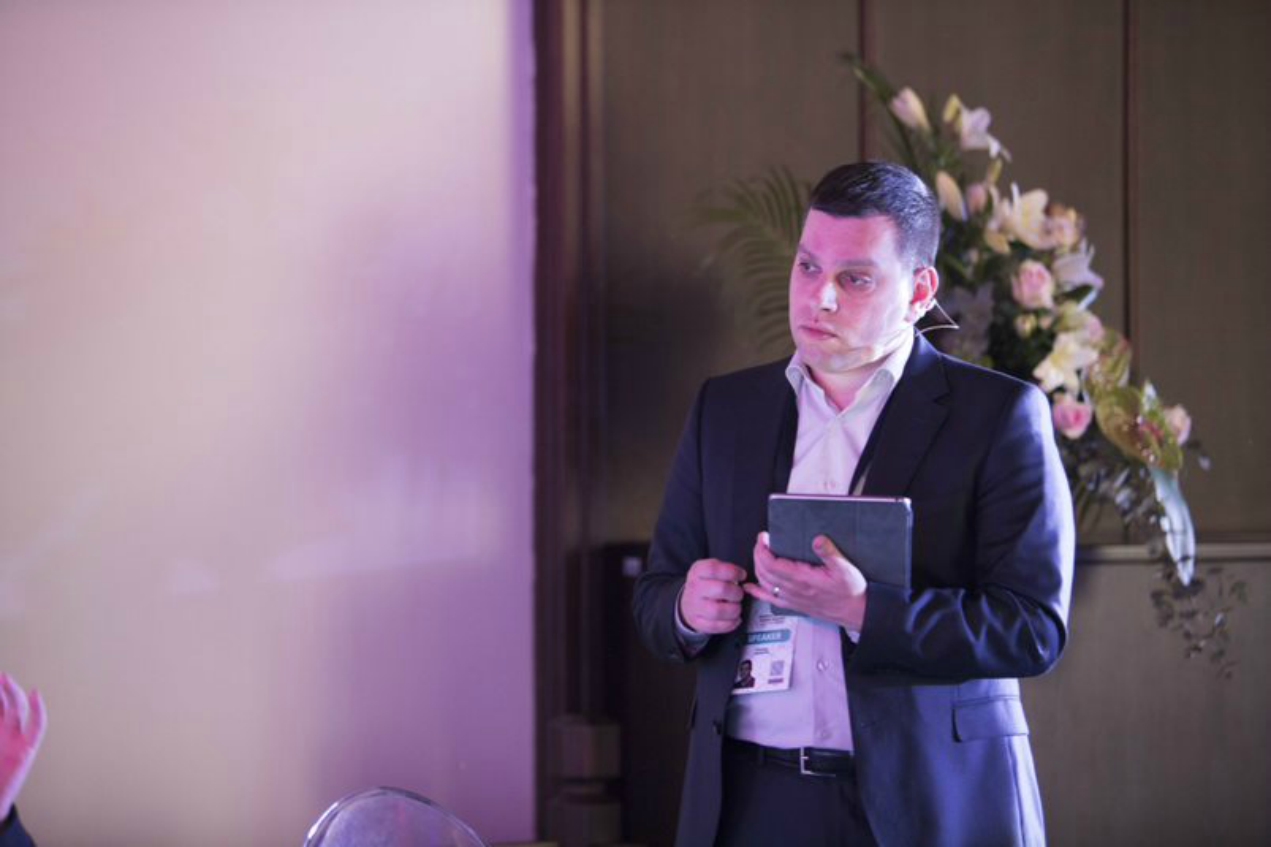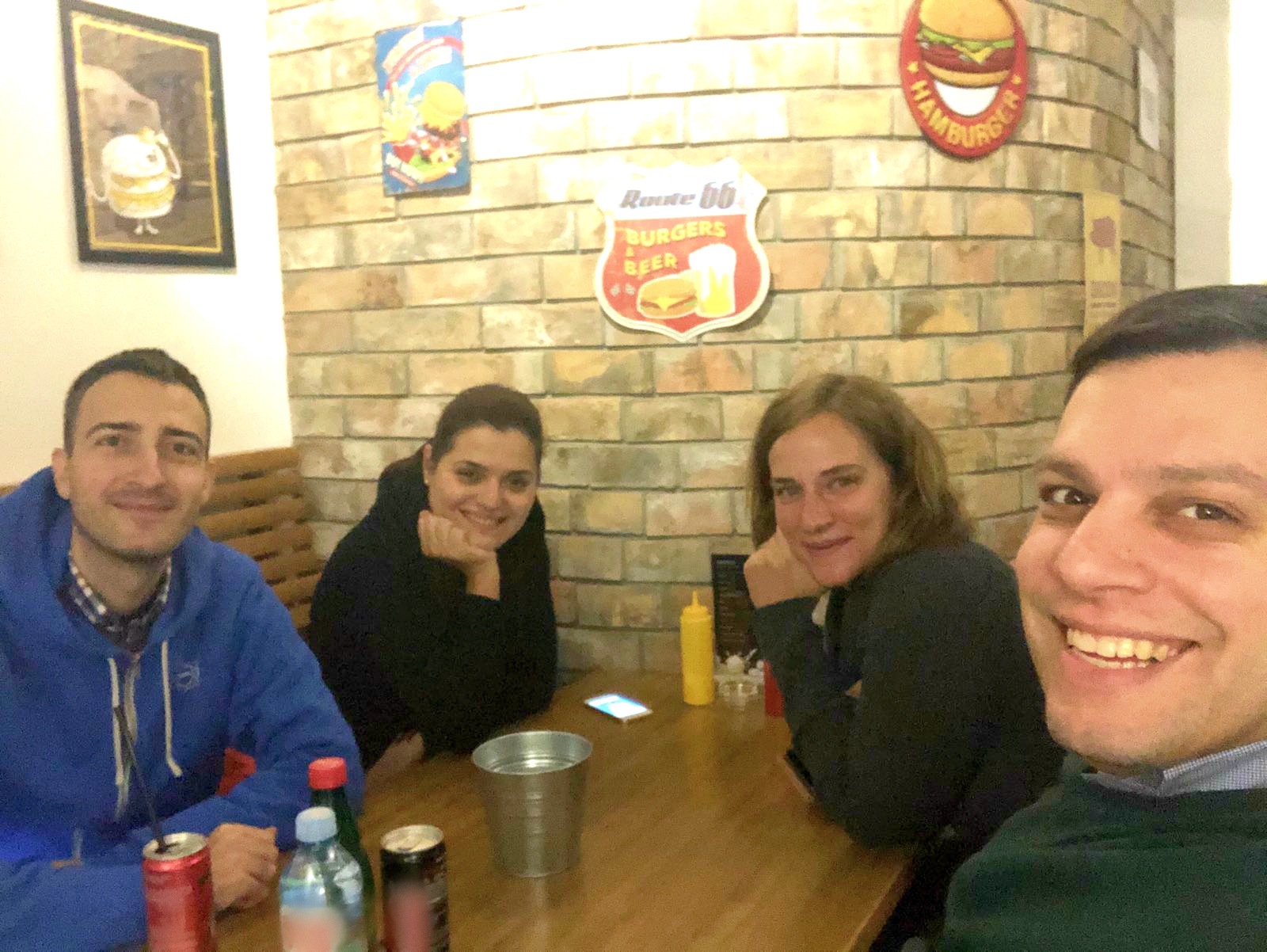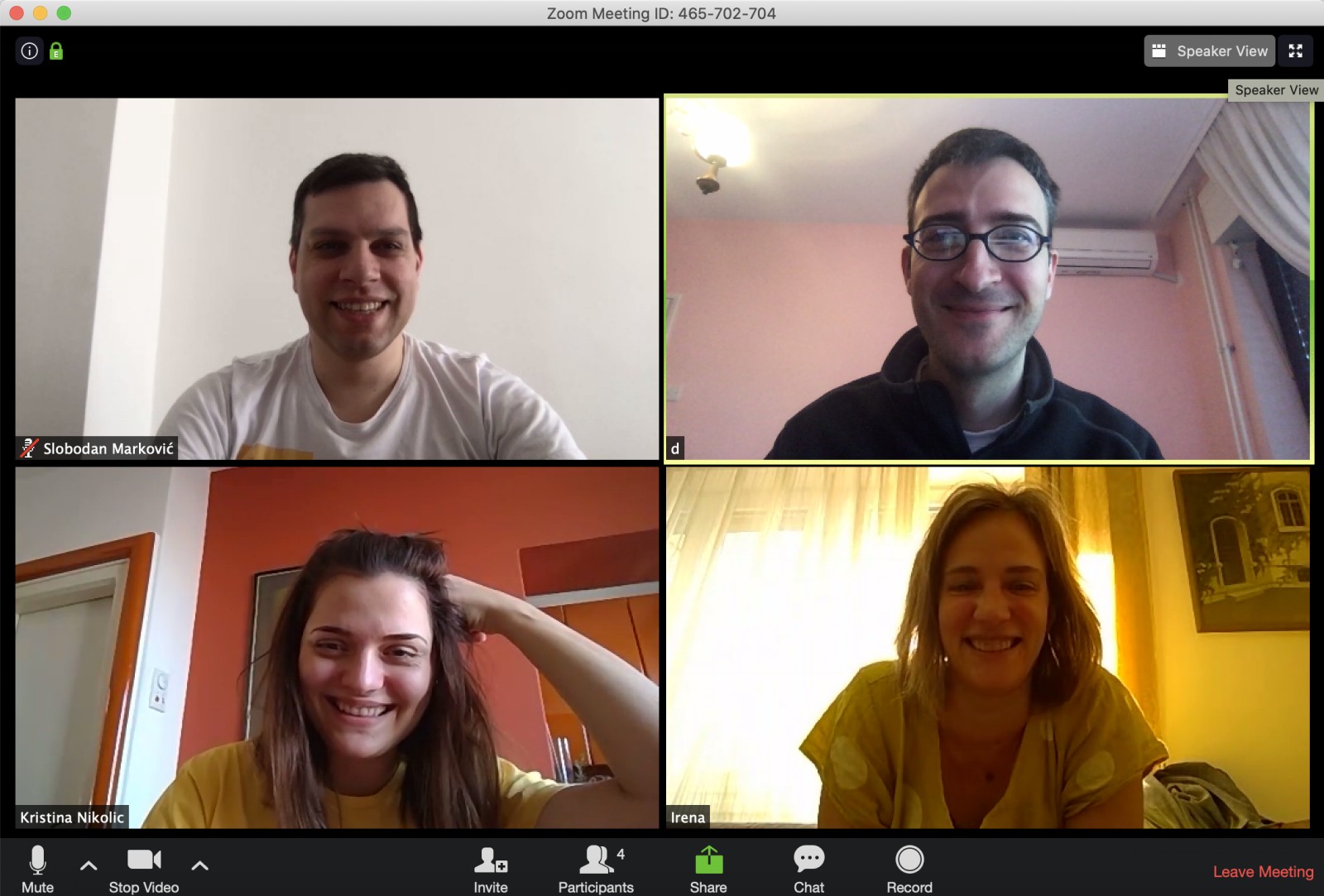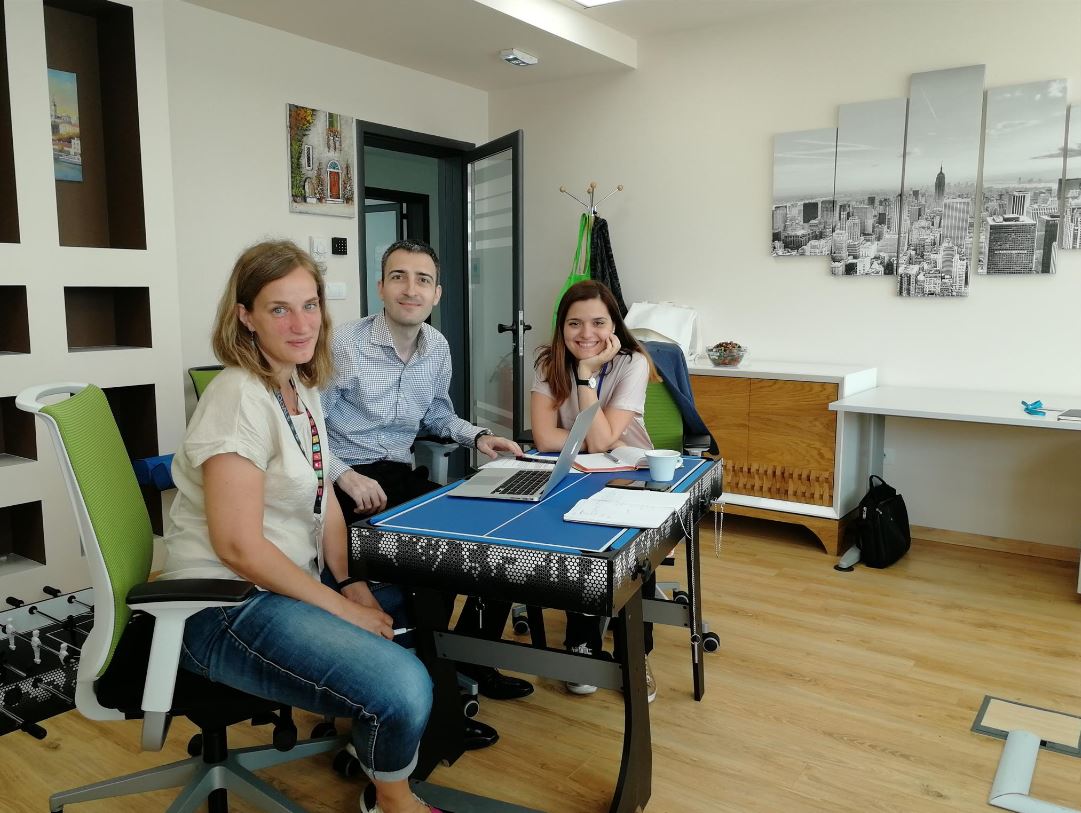Acclerator Lab team with UNDP Serbia Resident Representative Francine Pickup (left to right, first row: Kristina and Irena; second row: Draško, Slobodan and Francine Pickup)
Accelerator Lab Serbia Launch Party 2019.
Irena Cerović, Head of Soultions Mapping
Kristina Jazinka Nikolić, Head of Experimentation
Draško Drašković, Head of Exploration
Slobodan Marković, Technical Advisor for Digital Governance at UNDP
Innovations, discoveries, the human angle, experimentation, networking, these are the first thoughts that come to mind when the members of the Accelerator Lab in Serbia look back at their first year of work. The Serbia team was among the first ones to be established, among a total of 60 unique labs of this kind launched by UNDP throughout the world.
They started out as a trio: Draško Drašković – Head of Exploration, Kristina Jazinka Nikolić – Head of Experimentation, Irena Cerović – Head of Solutions Mapping; later on, they were joined by Slobodan Marković, the Technical Advisor for Digital Governance at UNDP, and from then on they play as a quartet. A comparison with musicians is not accidental. Owing to their diverse expert knowledge, and to their unique work and life experiences, each one of them brought a unique melody into the team, to be joined in harmony with others, so they can find potential solutions for the burning development issues in Serbia and the world we live in.
They don’t wear white lab coats, and as they put it, are not searching for a vaccine to COVID-19, but if the name of the game is a novel approach to complex development problems, such as the ones caused by the coronavirus, the UNDP Accelerated Lab is the right address for those searching for an answer. They explore, analyse and design new ways of implementing and scaling the already existing good solutions, to overcome the challenges facing developing societies. Thus, for example, the main problem that the Acceleration Lab in Serbia focuses on is depopulation, that is, the decrease of the country’s population.
In their experiments, they “mix up” the most diverse kinds of insights. What follows is one of the possible recipes concocted within the Lab, dealing with the topic that has preoccupied its members the most:
- 3 cups of direct personal experiences of individuals who live with, or have come up with a solution to a problem, such as stories from diaspora returnees;
- 2 cups of signals gathered from new sources of data, for instance, insights into the diaspora derived from analyses of social networks or data coming from the private sector;
- 1 cup of existing expertise, such as surveys for the purpose of creating public policies, or experiences of colleagues dealing with similar topics.
Mix the above ingredients at least 4 times and test and repeat each result thus obtained in a different social context, bearing in mind that not every solution will work for everyone.
Naturally, things are far from being as simple as the above example might suggest. Irena, Kristina, Draško and Slobodan talk about how they view their work, what they found more or less difficult than what they had expected, how the COVID-19 pandemic has influenced them and what kinds of challenges they expect to tackle in the near future.
How does this lab differ from what first comes to mind when we hear that word?
Draško: Our experiments are social experiments, but the Accelerator Lab has many similarities with scientific labs. You need to use your ideas and creative spirit to dig through data, form a testable hypothesis and design an experiment that will prove that the hypothesis is true or false.It’s impossible to predict the future. But it’s possible to predict general areas where new opportunities and unexploited possibilities are more likely to lie. The recipe for that is simple: start trying out new approaches in order to get the breakthroughs.
Slobodan: This involves analysing and mapping out the forces that influence a particular area, often by using new technologies and new sources of information, identifying the actors and their complex interactions, establishing partnerships with new organisations, informal groups and exceptional individuals, finding the best way to connect various points in the system and pull levers at different levels, which, all working together, will initiate some systemic change. The Lab is one of the ways in which UNDP is adapting to the needs of the 21st century, motivating partners to adopt these new approaches themselves, so that we can jointly exert a positive influence on the living and working conditions in Serbia and throughout the world.
Kristina: Essentially, what motivates us is curiosity, re-examining the status quo and boundless drive to experment, working as a team, using various approaches in our work, to provide answers to big, complex questions. We are aware that the world is changing very fast, and that the innovations in areas such as tech, communications, migrations, urbanisation are significantly changing the way we live and work. Accelerator Labs, as a global initiative, were created in response to the fact that the world around us is changing at an exponential rate, while the development lags behind, failing to keep up with the pace of change. There is a gap that needs to be closed if we want to keep up with all the changes and innovations.
Irena: All the major themes of today, which will determine the future of mankind– from climate change to the technological revolution – are entirely new, and we have no responses to them in either comparative practice or historical analyses. On the other hand, all these changes initiate well-known negative phenomena – such as extremism and violence, vulnerability, endangering human rights – so it is of additional importance that development-related innovations are dealt with precisely by the organisations that represent a kind of value-based foothold for mankind, such as a UN agency. It is of utmost importance to bear the human perspective in mind all the time, and to monitor the effects of each solution, while also continually testing and developing new solutions – including those that may appear very drastic or improbable at the moment.
What made you worry, and what turned out to be easier than you originally expected? What did you find surprising?
Kristina: Speaking as someone coming from the private sector, it was a very pleasant surprise to find great and inspirational individuals within the UNDP office, whom we found easy to connect and “click” with. Those are our colleagues with whom we were able to find topics of common interest very quickly, that we can explore together, or with whom we can pursue specific activities. On the other hand, we had to contend with the expectations that a team made up of three or four individuals could profoundly change the pre-existing manner of work, tackle the most relevant, complex issues of today and offer solutions that would unfailingly, like a magic wand, resolve all the problems that we are burdened with.
Irena: I am always afraid of silence – a situation in which it would turn out that no one cares very much about what you are working on. For example, when we decided to gather a group of fathers to talk to them for several hours about parenthood in Serbia, without offering any compensation or stimulation, what could have happened was that there were none willing to show up, or if they did, that they had nothing to talk about. What actually happened was precisely the opposite.
Internally, no matter how much the diversity of a given team is supposed to contribute to the quality of ideas, I thought that we would find it rather difficult to find a common language and agree on the first moves that we should make. As it turned out, in our case the diversity of experiences and worldviews truly proved complementary and contributed to new insights.
Draško: I was surprised when, during our research on depopulation trends, we discovered some positive deviance. We found out that in 2019 Serbia was a country attractive to digital nomads and with a high number of digital workers and gig workers per capita. For now, gig economy still cannot compensate for Serbia’s brain drain problem and the country needs to do more to retain and better use the existing workforce, to strengthen its education system to provide skills that are in demand globally.
Slobodan: I was pleasantly surprised when we managed to sign agreements of understanding with all three mobile phone operators in Serbia, which shows that the private sector is becoming increasingly aware of the value of data, and, more importantly, that it is ready to put those resources to use to help overcome development challenges in our country.
We are striving to get as close to real time data as possible, which is why we have decided to ask our mobile phone operators to allow us access to anonymised and aggregated data on the usage of their networks. The kind of data could be used for various purposes – from monitoring the spread of viruses, through preparations for and responses to natural catastrophes such as earthquakes or floods, to monitoring economic trends and depopulation.
Virtual morning coffee and making plans
How has the change in the manner of work brought about by Covid-19 influenced you?
Slobodan: The Covid-19 has essentially changed relations in the world on several fronts, it has laid bare some already noticeable trends, whereas it has relegated some things to history. It is an event that cannot be ignored, whose echo will resound throughout the next decade and longer. Apart from strategically pondering the changes that the Covid-19 brings and the ways of recovering and co-existing, in a manner of speaking, with the virus, the Lab provides support on a daily basis to colleagues and partners under the newly created circumstances. We are here to help when it comes to applying technology, new sources of information, advanced analytics and search for innovations.
Draško: We are all digital natives; therefore, we could easily switch to online work, but we missed our time spent together in the office and interaction with the outer world. A famous quote says: “A desk is a dangerous place from which to view the world.” But the crisis united the whole office to work as one.
Kristina: Anyone who has had even a single meeting with me knows that I always carry markers and colour pencils for mapping, sketching solutions or connecting unconnectable parts of the story. There is an anecdote circulating among my colleagues at UNDP that even during my job interview I asked if I could take out my markers and sketch my answers to the questions asked by the panel members! It is my impression that what we miss most is sitting down at the table together, rolling up our sleeves and confronting our opinions and colours.
Working remotely has its limitations, in spite of the Internet and all the digital tools for teamwork at our disposal. We used to have regular morning office meetings to both summarise what had been done and to talk about what new and interesting things had happened to each of us. We have shifted this practice into online, virtual space now. In this way, we try to maintain, while drinking our virtual morning cup of coffee, the working rhythm that we have established and not to lose the synergy that makes our Lab so special.
Irena: I cannot say that we have not been affected by this switch to working remotely – creative work is difficult enough in itself, and lack of real teamwork and non-verbal communication comes at a price. I miss the time dedicated to thinking together. On the other hand, all the changes that have occurred along with the pandemic can be regarded as a unique social experiment, and as such, they provide a fantastic working ground for the entire network of Accelerator Labs. This situation is also important for our work on depopulation, as it has the potential to change the rules of the game: on the one hand, it can have drastic negative effects on those segments of the population that are already at risk, whose potential society currently uses insufficiently (for instance, those whose income is solely from the informal economy); on the other, it can lead us to entirely new ides when it comes to the way we work, places we live in and the way we maintain contact with people.
As Draško has put it, we cannot predict the future, but as far as this quartet is concerned, it is certain that they will pursue to look for the right formula to solve the development challenges caused by the shrinking population in Serbia.
If we think of depopulation as a strong water current, that would mean seeking new opportunities and unexploited possibilities, that can serve as a boat and paddles to all individuals equally, to direct them towards calmer waters or land.
This is exactly where the solutions created by the Accelerator Lab in Serbia will lead, foremost in these 5 areas:
1. Circular migration – expanding cooperation with the diaspora, for example in partnership with the Returning Point, so that saying “Bon Voyage” once, doesn’t mean “Goodbye forever”.
2. Investing in human capital in Serbia – by creating new opportunities for innovative approach to education, work, social protection and health, in order to achieve better opportunities for advancement and greater satisfaction with the quality of life.
3. Creating equal opportunities for all age groups – young people are invaluable, but an aging society must adapt its approach to development to the older population, and answer this question: In what ways could the elderly become more actively involved in society?
4. Support for the families - while respecting different life choices, helping parents to have the desired number of children, as well as developing solutions that support fathers to take a more active role in childcare.
5. Environment and our living and working spaces - how to use natural resources smarter, and help growing cities to improve the quality of life of all community members?
You can find more information about the work of UNDP Accelerator Labs globally here.

 Locations
Locations
